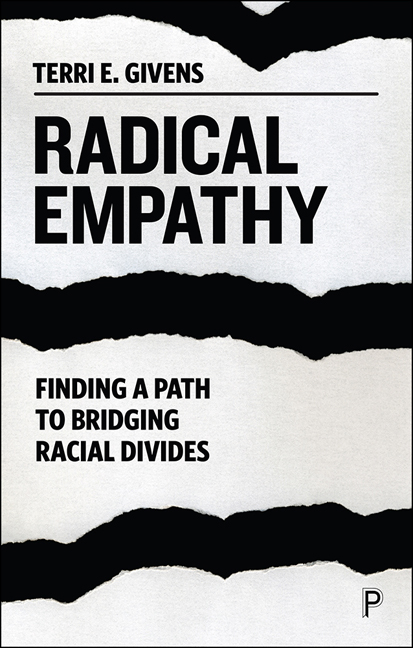Book contents
- Frontmatter
- Dedication
- Contents
- Note on the author
- Prologue:Writing in a time of crisis
- 1 Bridging divides: From racism to empathy in the 21st century
- 2 Getting to radical empathy
- 3 My family’s story: The isolation of internalized oppression
- 4 Racism and health disparities
- 5 Finding empathy in the academy
- 6 Love and marriage
- 7 Radical empathy in leadership: Creating change
- 8 Creating change at the national level: Restorative justice and working off the past
- 9 Revisiting the path to radical empathy
- Epilogue: The long road ahead
- Notes
- Suggested reading
- Index
6 - Love and marriage
Published online by Cambridge University Press: 05 January 2022
- Frontmatter
- Dedication
- Contents
- Note on the author
- Prologue:Writing in a time of crisis
- 1 Bridging divides: From racism to empathy in the 21st century
- 2 Getting to radical empathy
- 3 My family’s story: The isolation of internalized oppression
- 4 Racism and health disparities
- 5 Finding empathy in the academy
- 6 Love and marriage
- 7 Radical empathy in leadership: Creating change
- 8 Creating change at the national level: Restorative justice and working off the past
- 9 Revisiting the path to radical empathy
- Epilogue: The long road ahead
- Notes
- Suggested reading
- Index
Summary
I was a big Whitney Houston fan when the song “The greatest love of all” came out in 1985—I loved the message about learning to love yourself. I had purchased her first album when I was in college and listened to it on repeat. The song “Saving all my love for you” also resonated with me. Learning to love myself was one of the most important steps in my path to radical empathy, which, in turn, would help others. However, it would take years, some counseling, and falling in love with my future husband to truly learn to love myself.
My years in academe taught me the importance of opening up to accept the support of others, but I also had to learn more about becoming grounded in who I am. I believe that one of the most important steps in getting to radical empathy is accepting who you are, so that you can be more accepting of others. My search for identity went beyond my school years. For me, that search was integral to my search for love. I had to learn to love myself before I could love someone else.
The first step to developing my sense of identity was having empathy for myself. Having empathy and compassion for yourself is the ultimate form of perspective taking. It is important for developing a view of oneself as a whole person. It is easy to get hung up on the things we think need fixing, and to downplay the positive things that make up who we are. I struggle with this because it feels wrong to focus on my accomplishments when there is so much left for me to do, but I have tried to be clear about my positive achievements throughout this book. One of the things my mother often said, drawing on the Bible, was that I shouldn't hide my light under a bushel (Matthew 5:15). By focusing on the positive while accepting the negative, I work towards an identity that recognizes my faults while trying to improve on them, and that accepts my accomplishments while trying to build on them.
- Type
- Chapter
- Information
- Radical EmpathyFinding a Path to Bridging Racial Divides, pp. 99 - 114Publisher: Bristol University PressPrint publication year: 2021



